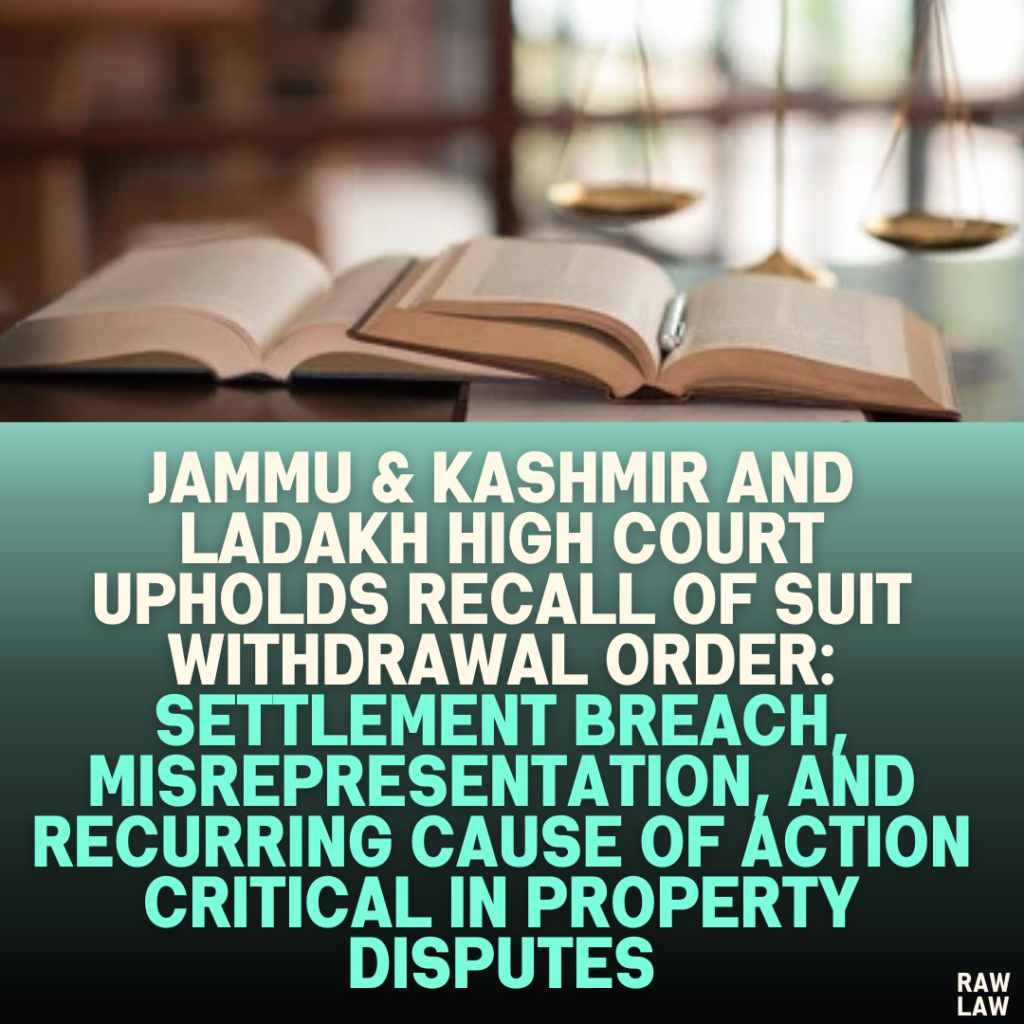Court’s Decision
The High Court of Jammu & Kashmir and Ladakh dismissed the petition filed under Article 227 of the Constitution, upholding the trial court’s order recalling the withdrawal of a suit. The petitioners were found to have misrepresented the settlement terms, leading to the recall. The High Court affirmed that the respondents (plaintiffs) had a recurring cause of action due to the unauthorized possession of their property. The petitioners were directed to pay Rs. 10,000 as costs, which would be a precondition for their defense in the trial court.
Facts
- Ownership and Lease: Respondents 1 and 2 owned a four-storeyed building and associated land in Srinagar. In 2019, the property was leased to respondent 3 through a registered license deed for Rs. 2 lakh per month for five years.
- Surrender of Premises: In December 2020, respondent 3 surrendered possession of the property to respondents 1 and 2, agreeing to clear outstanding dues of Rs. 6.7 lakh.
- Failed Settlements:
- Respondent 3 persuaded the owners to execute a fresh license deed for reduced rent (Rs. 1.8 lakh/month), but this agreement fell through when the draft was not returned.
- Another license deed was drafted in favor of the petitioners (real brothers), but they refused to sign it or pay the license fee.
- Legal Action: Respondents 1 and 2 filed a civil suit for possession, arrears, and damages. They later reached an out-of-court settlement on August 8, 2023, agreeing to withdraw the suit against the petitioners upon payment of Rs. 39 lakh and the handover of possession.
- Breach of Settlement: The petitioners failed to vacate the property or honor the settlement terms. Respondents 1 and 2 filed an application under Order 23 Rule 3A read with Section 151 CPC to recall the withdrawal order.
Issues
- Validity of the Recall Order: Whether the trial court’s recall of the withdrawal order was legally justified.
- Limitation Period: Whether the application for recall was barred by the Limitation Act.
- Recurring Cause of Action: Whether the respondents had an ongoing right to seek possession due to the petitioners’ unauthorized occupancy.
Petitioner’s Arguments
- Finality of Withdrawal: Under Order 23 Rule 1(4) of CPC, the unconditional withdrawal of a suit bars any re-litigation on the same cause of action.
- Limitation Bar: The recall application, filed 10 months after the withdrawal order, was beyond the permissible limitation period.
- Lack of Exceptional Circumstances: No compelling reasons were demonstrated to justify recalling the withdrawal.
Respondent’s Arguments
- Conditional Nature of Withdrawal: The withdrawal was based on the settlement, which the petitioners failed to honor, making the withdrawal invalid.
- Timely Filing: The recall application was within the three-year limitation period under Article 137 of the Limitation Act.
- Recurring Cause of Action: The petitioners’ unauthorized possession gave rise to a continuing grievance, justifying the recall.
Analysis of the Law
- Order 23 Rule 3A CPC:
- This provision allows for the recall of orders in cases where a compromise or settlement is not honored.
- The High Court observed that the recall application was validly filed under this provision to address the alleged misrepresentation.
- Statutory Remedies and Recurring Cause of Action:
- The High Court rejected the petitioners’ argument on limitation, holding that unauthorized possession created a continuous cause of action for the respondents to seek possession of their property.
- The court emphasized that procedural limitations cannot override substantive statutory remedies available to litigants.
- Misrepresentation:
- The petitioners’ actions were found to amount to misrepresentation and breach of the settlement, justifying the trial court’s recall of the withdrawal order.
Precedent Analysis
- Jet Ply Wood Pvt. Ltd. v. Madhukar Nowlakha (2006):
- Held that courts could recall withdrawal orders in cases of fraud or misrepresentation under Section 151 CPC.
- Navratan Lal Sharma v. Radha Mohan Sharma (2024):
- The Supreme Court clarified that in cases where settlement terms are breached, restoration is the appropriate remedy.
These cases were relied upon to affirm that the trial court acted within its jurisdiction.
Court’s Reasoning
- Validity of Recall:
- The trial court correctly invoked Section 151 CPC, relying on precedents, to prevent abuse of process and protect the respondents’ rights.
- Limitation:
- The court ruled that the continuous unauthorized possession by the petitioners created a recurring cause of action, rendering the limitation argument irrelevant.
- Policy Considerations:
- The High Court underscored the judiciary’s obligation to ensure access to remedies for litigants, particularly in cases involving property rights and misrepresentation.
Conclusion
The High Court upheld the trial court’s decision to recall the withdrawal order, finding no merit in the petitioners’ objections. The petitioners were directed to pay Rs. 10,000 in costs as a precondition for defending the suit in the trial court.
Implications
This judgment highlights:
- The judiciary’s commitment to upholding the principles of equity and fairness in cases involving misrepresentation.
- The significance of recurring cause of action in property disputes.
- The courts’ discretion to ensure that statutory remedies are not curtailed by procedural limitations.
The decision reinforces that breach of settlement terms can justify the recall of orders, ensuring justice for aggrieved parties.
